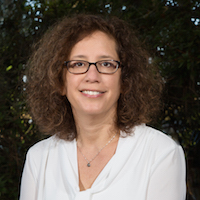Gillings School researchers join ‘creativity hubs’ to fight obesity, improve water access
May 8, 2018

Dr. Penny Gordon-Larsen
The new Creativity Hubs initiative at the University of North Carolina at Chapel Hill has announced awards to campus research teams pursuing solutions to two of the world’s most pressing issues: the obesity epidemic and the global clean water shortage. One hub will be led by UNC Gillings School of Global Public Health faculty member Penny Gordon-Larsen, PhD, and both hubs include several researchers who represent the Gillings School.
The Creativity Hubs initiative was developed by Vice Chancellor for Research Terry Magnuson as a platform on which to assemble teams of researchers from diverse disciplines to tackle major societal challenges and leverage additional support from external sponsors.
“While Carolina has long prided itself on its culture of low stone walls, we must be aggressive in capitalizing on our unique strengths and positioning our faculty to tackle major scientific challenges,” Magnuson said. “The two project teams that have been selected for these initial awards embody the bold approach that I envision of Creativity Hubs award winners.”
Leveraging the strengths of Carolina’s schools of medical and health sciences, its affiliated research centers and institutes, and its prowess in big data management, the Heterogeneity in Obesity Creativity Hub will take a novel approach to assess the underlying causes of obesity, tapping information that has not been traditionally studied to unlock new, targeted ways to treat the disease.
 “Carolina has a long history of outstanding obesity research in many different areas of science,” said Gordon-Larsen, principal investigator for the obesity hub and professor and associate chair for research in the Gillings School’s Department of Nutrition. “But, as with individual factors contributing to obesity, integration of all of that very valuable information hasn’t happened yet. The Creativity Hubs award has given us an amazing opportunity to get these diverse scientists on a single project to develop tools for obesity research, prevention and treatment.”
“Carolina has a long history of outstanding obesity research in many different areas of science,” said Gordon-Larsen, principal investigator for the obesity hub and professor and associate chair for research in the Gillings School’s Department of Nutrition. “But, as with individual factors contributing to obesity, integration of all of that very valuable information hasn’t happened yet. The Creativity Hubs award has given us an amazing opportunity to get these diverse scientists on a single project to develop tools for obesity research, prevention and treatment.”
By developing an automated tool to rapidly analyze and integrate large data sets, the team will seek answers to why individuals with the same diet experience weight gain and loss differently. The research is expected to lead to more personalized treatments that take into account the wide range of factors — from diet, to social influences, to genetics — that contribute to weight gain and loss. (In addition to Gordon-Larsen, 14 additional Gillings School researchers will contribute to the work of this hub; see their names at the bottom of this article.)
Addressing a different need, one that affects more than 1.8 billion people worldwide, the Sustainable Access to Clean Water Creativity Hub will pursue the development of an innovative, affordable, membrane-based water purification tool that can safely remove a broad range of water contaminants.
 “The Creativity Hubs initiative has allowed us to assemble a unique team of scientists and engineers with the background and expertise to tackle a major global problem” said Theo Dingemans, principal investigator for the sustainable access to water hub. “Our team is excited to advance solutions to these scientific and engineering challenges, and we are especially motivated and inspired to provide practical and affordable solutions that will impact the lives of individuals and communities worldwide.”
“The Creativity Hubs initiative has allowed us to assemble a unique team of scientists and engineers with the background and expertise to tackle a major global problem” said Theo Dingemans, principal investigator for the sustainable access to water hub. “Our team is excited to advance solutions to these scientific and engineering challenges, and we are especially motivated and inspired to provide practical and affordable solutions that will impact the lives of individuals and communities worldwide.”
The project team, made up of researchers from UNC-Chapel Hill and the University of Texas at Austin, includes three faculty members from the Gillings School of Global Public Health: Orlando Coronell, PhD, associate professor of environmental sciences and engineering; Cass T. Miller, PhD, Okun Distinguished Professor of environmental sciences and engineering; and Jill Stewart, PhD, associate professor of environmental sciences and engineering and deputy director of the UNC Galapagos Initiative and the Center for Galapagos Studies.
Building on existing graphene and graphene oxide membrane technologies that have shown promise as water purifiers, the team will seek to develop new filters that make water purification more energy-efficient and to lay a foundation for large-scale, affordable membrane production.
 The inaugural winners of the Creativity Hubs awards were selected from proposals involving 194 UNC researchers from 35 departments in 10 schools and the College of Arts & Sciences. Each team will receive up to $250,000 toward the development of their proposals. Progress will be assessed after one year and the teams could be eligible for up to an additional $250,000 in funding.
The inaugural winners of the Creativity Hubs awards were selected from proposals involving 194 UNC researchers from 35 departments in 10 schools and the College of Arts & Sciences. Each team will receive up to $250,000 toward the development of their proposals. Progress will be assessed after one year and the teams could be eligible for up to an additional $250,000 in funding.
The Vice Chancellor for Research currently is exploring opportunities to fund additional hubs in the future. For more information on the UNC Creativity Hubs initiative and the winning teams, please visit: research.unc.edu/creativity-hubs.
Additional Gillings School researchers involved in the Heterogeneity in Obesity Creativity Hub include: Christy Avery, PhD, assistant professor of epidemiology; Ethan Basch, MD; professor of health policy and management and director of the UNC Lineberger Comprehensive Cancer Center; Ian Carroll, PhD, assistant professor of nutrition; John E. French, PhD, adjunct associate professor of nutrition; Rebecca Fry, PhD, Carol Remmer Angle Distinguished Professor of environmental sciences and engineering and director of the Institute for Environmental Health Solutions; Annie Green Howard, PhD, clinical assistant professor of biostatistics; Stephen D. Hursting, PhD, professor of nutrition; Michael R. Kosorok, PhD, W.R. Kenan, Jr. Distinguished Professor of biostatistics and chair of the biostatistics department; Leslie A. Lytle, PhD, professor of health behavior and nutrition; Katie Meyer, ScD, assistant professor of nutrition; Kari North, PhD, professor of epidemiology; Sally Clark Stearns, PhD, professor of health policy and management; Susan Sumner, PhD, professor of nutrition; Deborah Tate, PhD, professor of health behavior and nutrition and director of the Communications for Health Applications and Interventions Core; and Steven Zeisel, MD, PhD, professor of nutrition and director of the UNC Nutrition Research Institute and the UNC Nutrition Obesity Research Center.
This article is adapted from the original announcement published by UNC Research.
Gillings School of Global Public Health contact: David Pesci, director of communications, (919) 962-2600 or dpesci@unc.edu
